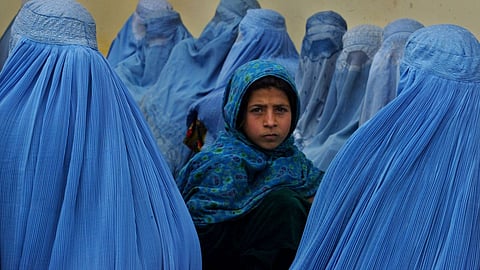
- HOMEGROWN WORLD
- #HGCREATORS
- #HGEXPLORE
- #HGVOICES
- #HGSHOP
- CAREERS
- ABOUT US
- CONTACT US

Do you all recall the viral video that surfaced online of people desperate to get on the US military aircraft as it was taking off from Kabul, Afghanistan? In the wake of the Taliban takeover of Afghanistan thousands of people were so desperate to save their lives that some were even seen hanging on the wings of the departing airplane and some even dropped to their deaths from the airplane in flight. The saddest part about the video is that the people were willing to risk death, rather than stay in Taliban-ruled Afghanistan. Public memory is short. Many of us may have forgotten that video and the geo-political circumstances building up to it but present-day Afghanistan continues to live under the Taliban’s rule of terror.
The bloodied pages of Afghanistan's history have witnessed several wars over centuries but none has left a deeper impact on the current generation than the US War in Afghanistan (1999-2021). Several notable historical moments have happened in the 20-year “war on terror” launched by the United States against the Al-Qaeda-Taliban coalition. The world has witnessed the Twin Tower attacks, the death of Al-Qaeda leader Ossama-bin-Laden, the surrender of Taliban leader Kandahar, the collapse of the Afghan Government, the subsequent Taliban’s rise to power under the leadership of Haibatullah Akhundzada and eventually the end of the war in August 2021, when the US Government withdrew all its troops from Afghanistan, leaving the country at the mercy of the Taliban.
We can debate politics all day and question Joe Biden’s decision to withdraw troops at a crucial point in history. Some even say that the Americans washed their hands off from a war that they brought about in the first place. No matter what your stance is regarding the US-Afgan War, there is no denying that it is the innocent people of Afghanistan that have suffered the most. It is their blood that has been spilled the most, their homes that they have lost, their family, and all those who have managed to survive to see the end of the war, now live under the Taliban’s rule of horror.
"War does not determine who is right only who is left."
Bertrand Russell (The Armistice 1918-2018)
This quote rings true universally for any wars that man has waged at any point in history. A question that has been asked often in society is “Can art heal a war-torn country?” Opinions might differ on this question but one thing is for certain — art can help reclaim, revive, reinterpret, and most importantly keep alive in memory the struggles of the oppressed in a war-torn country. That is the aim of visual artist, Aziz Hazara and his first solo exhibition in India.
Name of the exhibition: No Starting Point for Revolution
Date: April 21, 2023 (Friday)
Time: 6 – 8 pm (Opening preview)
Venue: Experimenter – Ballygunge Place, Kolkata
In this particular exhibition, Hazara works across the mediums of photography, video, sound, and installation art. Through his works, you will come across themes of memory, archive, surveillance, the panopticon, and politics of representation within the context of decades of violence and war in Afghanistan. No Starting Point for Revolution intends to address the essence, struggle, and sensibility of what it is to live in a war zone, where the body and the landscape are under constant attack. The exhibition will propose that a true end to the war in Afghanistan rests on resistance and the people’s ability to identify invisible structures of power and control that uphold the conflict and the truths that lie behind them.
Aziz Hazara was born in 1992 in Wardak, Afghanistan. He works across various media such as video installation, photography, sound, and sculpture. His work addresses the relationship between various dichotomies such as proximity and distance, reality and fiction, and war and peace amongst many others. Hazara currently lives and works between Kabul and Berlin.
